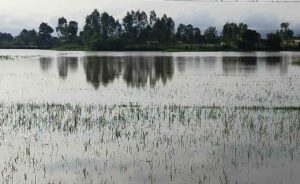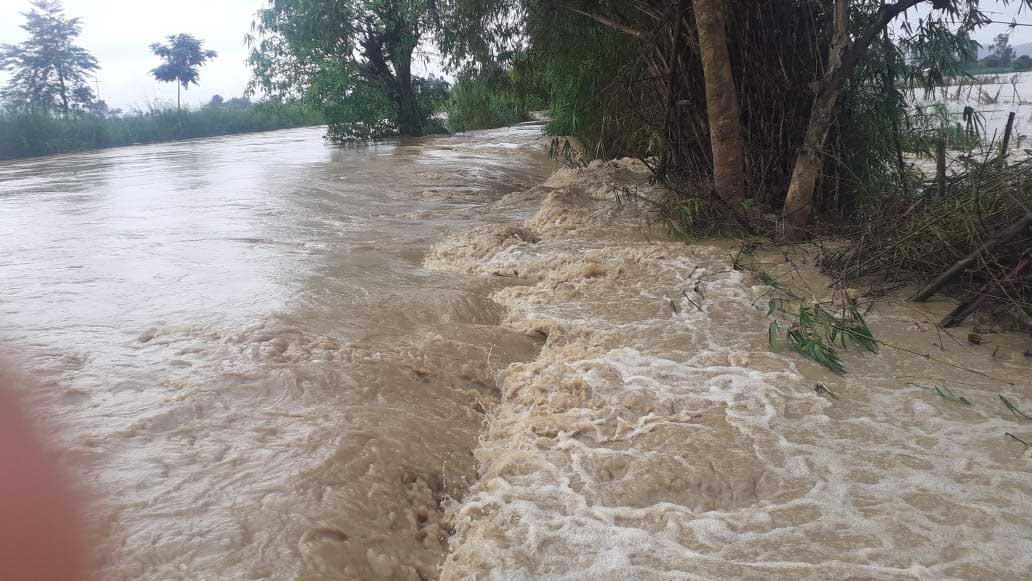“The flood that occurred in the first week of October this year, 2024, has destroyed all the vegetables that was supposed to earn a profit of some lakhs of rupees. This disturbance has broken down the financial cycle to be invested for the next agricultural purposes” says Keisham Jayanta who is a progressive farmer for the last 30 years. Mr. Keisham Jayanta Singh (73 years) of Wabagai Thingel Leikai expressed that he has been cultivating vegetables such as beans, brinjal, chilly, cucumber in his one sangam of field area at Luwangtou Loukol (Kharungpat). This year he had faced five floods, three of severe ones. His place is known for mass production of vegetables in the state. Before next year April shower, he is planning to grow wheat, pea and mustard plant in his field as other vegetables have been destroyed by the floods. Because of these calamities that destroyed all his vegetables, it is very hard for Jayanta to support his family. With a hope he is now ready for growing cabbage and onion for saplings which can regain his lost within a short period of time.

Local media reports that more than 200 hectares of paddy fields and fish farms have been flooded at Wabagai Thingel Bedam Khong Mamang, Kakching district in the first week of October this year. With water overflowing from the Sekmai river, more than 200 hectares of paddy fields and fish farms have been flooded at Wabagai Tera Urak, Wabagai Mairenbam and Keirak Awang Loukon. Wabagai area of Kakching district is known for being a major producer of local vegetables in the state.
Another farmer, practicing farming for the last 30 years, Sapam Lukhoi Singh (53 years) from Wabgai Thingel Leikai who had received ‘Best Innovator Award’ for many years lamented that he had lost all his vegetables such as tomato, chilly, French-beans, capsicum, sweet corn, mustard etc. due to the floods that occurred this year in the state. Last year he earned 7 to 8 lakhs. This year only he had lost 3 lakhs rupees. He suffered a lost this year because of frequent floods that destroyed all his vegetables again and again. He invested for his farming by borrowing 2 lakhs from his friends and one lakh from a private Bank.
All his hopes and dreams have been flushed out by the floods that occurred frequently in the state. For the next season, he does not have any money to invest. As he is not equipped with other skill or profession, he could not find other jobs rather than farming. To back-up his lost money, Lukhoi is ready to show mustard seed to sell it as nursery which required short duration. Normally, he could sell his vegetables for Rs. 4000 to Rs. 5000 per day. But this year he cannot sell his vegetables properly as the frequent floods destroyed his vegetables repeatedly.
He opined that only mixed cropping and integrated farming is the only solution to reduce the problem faced by the farmers. As to run his family he needs to earn money by any means through hard work. But he could not find any other options, rather than farming even it makes his dreams eroded by the floods. It is hard for Lukhoi this year to bear his overall family requirements including education of his three children with unbearable loss. Lukhoi is expecting some financial help from the concerned authorities to support his living and help in making Manipur a self-reliant state.
A flood-stricken breadwinner farmer Mrs. Mayengbam Premabati Devi (50 years) who have been putting all efforts sowing mustard repeatedly in her one Sangam of field could not make any profit this year because of the frequent floods. As mustard plants can be harvested many times, Premabati chooses mustard as the best crop. So, she sowed it three times this year but could not make her best sell as the flood destroyed the crops. In previous years she could earn some lakhs of rupees from mustard plantation. But for this year, it is hard to run her family with huge shortfall in her income due to the floods. Narrating her struggles and trouble in bearing all the family expenses and about her children education, she expects some help and support from the concerned authorities to assist their livelihood.
Another distressed farmer Maibam Biren from Wabagai rears Climbing Perch (Koi/Ukabi) fish in his one acre of pond for the first time this year. The floods that occurred this year have swept away all the fishes which he reared in three phases. During April to May this year, he invested around one lakh eighty thousand rupees which was expected to earn 3 to 4 lakhs of rupees in returned. Previous years he reared many fishes like grass carp, silver carp, rohu and others. From this year experience, he decided that he would not further rear any fish. Keisham Raju Singh, Keisham Jenil Singh and many others farmers faced similar problems and losses. They have lost all their reared fishes and vegetables. Even they cannot recover the invested amount rather than making any profit. The floods that occurred three – four times in the area this year have created many inconveniences to many farmers and others too in different ways.
Talking to IRAP, Prof. L. Nabachandra, Head Department of Agronomy, College of Agriculture, Central Agricultural University (CAU), Imphal suggested that because of climate variability and changing pattern of rainfall the farmers of the state need to approach integrated farming system. Citing that crop as an enterprise in agriculture sector, a farmer needs to practice three or four agricultural enterprises. For example, crop with fishery, poultry and bee keeping etc., so that when any natural eventualities occurred, it could save one or more enterprises (livestock, fishery, bee keeping etc.) which can save from great loss for the farmers.
Prof. Nabachandra recommended that depending on the situation and timing farmers should practice integrated farming with two or more enterprises. Citing an example Nabachandra said, if a farmer has a dairy farm, he could rear fishes if the space is available so that all the waste from the dairy farm could be used as feed for fishes and planting of grass such as Napier which could feed the cattle as fodder. This system can reduce the cost of production and pollution. Integrated farming will be more fruitful if it is practiced with scientific knowledge incorporated with skills and experience. He also put his suggestion of introducing Buffer seed Stock in the state so that it can help the farmers in supplying the seeds after the floods and can also be used for consumption if floods didn’t occur. Pointing the importance of integrated farming, Prof. Nabachandra said that it can control pollution, increase in vegetative coverage which can reduce the impact of climate variability and increase the income of the farmers.
In this regard, Athokpam Nomita Chanu, Technical Officer Agromet (GKMS), ICAR, Manipur Centre, Lamphelpat said that this year (2024) the state experienced moderate to heavy rainfall. From April onwards continuous rainfall occurred above the normal ranges. This year received maximum number of days with heavy and moderate rainfall as compared to last year which received more days of light to moderate rainfall distribution. This results for the occurrence of frequent floods in the state of Manipur this year. She further explained that the reason for the frequent floods in the state cannot be considered only on the regional value or localized value.
Apart from many factors such as deforestation, climate variability, human activities, illegal activities, poor drainage system etc., the changes in the distribution of rainfall patterns occurred due to the different cyclones coming from Bay of Bengal. If cyclone comes continuously, it brings moderate to heavy even very heavy rainfall. The state received adequate rainfall with the arrival of cyclones. During this period, if there is lack of management in the dam and other drainage systems, or waterways, it leads to flood.
Keeping in view the different challenges faced by the farmers during and after floods, the concerned authorities need to take up strategies that can work together to provide both short-term relief and long-term resilience for farmers facing flood risks in Manipur.
(The article is filed under the 5th State Level Media Fellowship Programme on Climate Change under the sponsorship of the Directorate of Environment and Climate Change, Government of Manipur)












